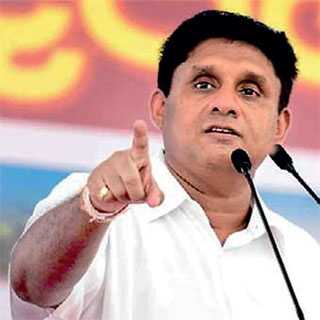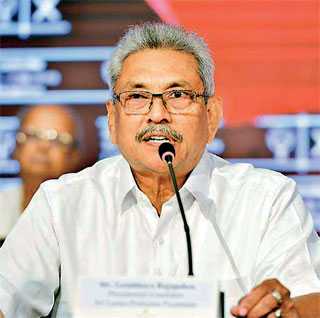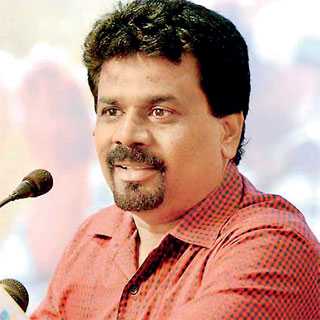Wednesday Feb 25, 2026
Wednesday Feb 25, 2026
Friday, 18 October 2019 00:00 - - {{hitsCtrl.values.hits}}
Elections are here, time for pacts, pledges and promises – the time-tested Sri Lankan way of savouring democracy. The sooner you get them negotiated and sealed the better. 
Formation of alliances before a Presidential Election is normal in Sri Lanka. The number of registered political parties is close to 70 and the coming together of these parties into different alliances is an experience in itself. The landscape is surely getting ready for the day in mid-November. The Election Commission has released the final list of candidates. A total of 41 had placed cash deposits and 35 had handed over nomination papers.
The hostile and unfavourable atmosphere surrounding minorities especially Muslims is fading. At least the demonisation bandwagon has momentarily halted and other connected issues either relegated or forgotten. Muslims went through a lot psychologically, emotionally, economically and by way of life in the days leading up to the election. Each presidential aspirant will no doubt will try and placate to woo them back.
For the record remember the outrageous ‘vanda beheth’ – allegedly introduced by Muslims into food to render Buddhists infertile? Remember the infamous killer doctor Dr. Shafi who had supposedly sterilised 4,000 Sinhala Buddhist women after caesarean deliveries? Remember the force feeding of halal food to non-Muslims? The list goes on. The conspiratorial deception behind Dr. Shafi’s arrest and incarceration is public knowledge now.
The phantasmagoria is either remotely clouded or awaiting a new script. For now the curtain is down. Depending who comes to power on 16 November, curtains may go up once more or maybe permanently shut.
The script writers are taking a break it seems and so are the directors, producers and the actors, or is it?
Election promises
Not so fast, in essence they’ve been catapulted from one genre to another. They’re on assignment for another more important exercise. Writing election promises in all three languages to reach approximately 17 million registered voters. This is another specialist job.
They have got to recognise both the apparent and no-so-apparent needs of the voter, enabling a good fit. They’ll target grandparents, parents, children including the unborn. Not that the promises will be fulfilled, there is no chance in hell that it will happen, there is no evidence in contemporary history that ambitious and infeasible promises were ever fulfilled.
A gross distortion of the democratic process accelerated in the last decade. Yet, you should never miss the flamboyance of the politician when he makes the pronouncements of benefits, bonuses and bonanzas.
The image of the angler best describes elections in Sri Lanka. You fine-tune the bait and fling that dainty allurement far and wide hoping it would engulf the denticulated mouth of the fish then just continue to pull it towards you. It all depends what you dangle or coat the bait with.
Sri Lanka has a unique yet notorious history when it comes to election promises. Bait after bait thrown at people both from election manifesto and whimsically. And the people buy it. It will be no different this time. Political leaders throw at people anything and everything that comes to their mind. The most famous and memorable being the fatuous promise from late Prime Minister Sirimavo Bandaranaike’s ‘rice from the moon’. Yes she promised to bring rice from the moon.
Between a promise and policy, the former has always worked for the local constituency; no wonder Sri Lanka continues to be a developing country. Not because the audience is unintelligent or uneducated but corruption is so endemic and the attitude of the average voter is “give us some before you devour the whole thing” which seems sensible considering the gargantuan sums that official records confirm being taken by different individuals and institutions in multiple corrupt transactions.
Corruption in Sri Lanka
Corruption in Sri Lanka is a metastasised cancer, entrenched and unarrestable.
Chandrika Kumaratunga virtually seduced the country with her charm and charisma. Repeatedly promised to abolish the executive presidency before she became an executive president. From the very outset of her term she said that she would abolish it, but tenaciously clung to it until she completed her two terms.
 |
Sajith Premadasa |
 |
Gotabaya Rajapaksa |
 |
Anura Kumara Dissanayake |
Then came the absolutely vacuous Rajapaksa election promises bedecked with a supposed vision. Chinthana promised many things, they were cleverly crafted and sold to the public. The planning process involved the participation of many especially those from the private sector. Many a “free meal” was included for the tamasha.
Here is a glimpse extracted from the archives. Duty-free import of a vehicle each to Government servants (Rs. 500,000 loss per vehicle, 10,000 vehicles) – Rs. 5,000 million; fertiliser at Rs. 350 per 50 kg bag – Rs. 7,000 million; Samurdhi increased by 50% for all 1.8 million recipients – Rs. 28,000 million; 65,000 houses for shanty dwellers (10,000 houses per year at Rs. 500,000 each) – Rs. 5,000 million, further 50,000 houses for soldiers – Rs. 5,000 million; Rs. 400,000 for each displaced family (250,000 families) – Rs. 100,000 million. How many of these promises were fulfilled?
How can we forget the infamous “good governance” era? An unprecedented irony never, ever to be repeated. It wouldn’t be incorrect to state the duo President Maithripala Sirisena and Prime Minister Ranil Wickremesinghe redefined good governance for the whole world.
“I will not hesitate to strengthen the current institutional framework to fight against corruption and take action – without any favour – against those who are now facing charges for misusing State properties,” the President told Parliament. Vacuous words still continue to haunt the ordinary citizen. Nowhere in the world had a sitting government got so contagiously typhlotic, amnesic on an immaculately executed high noon heist of its own Central Bank.
Already the two main contenders for the upcoming Presidential Elections have launched their set of promises in style. Gotabaya Rajapaksa has promised free fertiliser, which is already mostly subsidised, commodity price support and sweeping write-offs.
He said: “We will give a good fixed price for rice in the market and storage facilities for the farmers so they can sell their product without selling them for a lesser value or without a middle man.” He also said, “And we will also cut off all the micro loans and any other loans of farmers for good.”
“We want to make the agriculture a sector that attracts the younger generation and we want to make farmers rich,” Sajith Premadasa speaking in Colombo said. “We will start another project to give extra support to people who are under the ‘Samurdhi’ project.”
A nation’s migration from a developing to being a developed country is achieved through an intelligent, rational and conscious process. Arbitrary spending is an entrenched process the country has got used to. This is a vicious debt trap that can danger the economy in multiple ways. It’s only by incorporating truly implementable hybrid policies vis-à-vis needs that the country can grow without stifling itself. A culture rooted in promises will enable all the wrong people in and take the nation on a precipitous path.
The overall debt of Sri Lanka according to some estimates is in excess of Rs. 8 trillion which is extremely high for a developing country. Economics is such an esoteric subject the pundits mislead and the lay stomach the feed. What uncontrollable debt does to economies is quite irreparable. Also it’s learnt there is no one to one asset value for the corresponding debts taken.
Easter attacks
Another distortion is the mystery that surrounds the dastardly act committed on 21 April 2019. It still reverberates. Many intelligent questions linger and remain unresolved. The Easter Sunday gruesome bombings that killed at least 250 people in Sri Lankan churches and hotels. Was this act an act of unalloyed terrorism or something else?
The respected Malcolm Cardinal Ranjith of Colombo seems to differ from the official story. There appears to be a big mismatch in the actual narratives. The Cardinal blamed the country’s authorities for security lapses that allowed the deadly Easter Sunday bombings to occur.
“The Government should hold an impartial inquiry and find out who is responsible for these attacks,” Cardinal Ranjith said. “From the first moment I was convinced that it wasn’t our Muslim brothers who had done this attack, that behind this attack there is someone with global political interests,” he said.
“For this reason, I asked Catholics, and Buddhists and everyone else, to not raise their hands against our Muslim brothers, because it was clear that the Muslim community had nothing to do with this.”
Though names according to the media of those who carried out the attack were all Muslims, Malcom Cardinal Ranjith exonerated all of them. This is a moot point in the case that has shed a lot of doubt and a degree of incomprehensibility to the official version.
Albert Malcolm Ranjith Patabendige Don often known simply as Malcolm Ranjith is the Cardinal of the Catholic Church of Sri Lanka. This personality cannot be separated or isolated from what happened on 21 April. All those who perished on that day are his people and what he has to say matters.
The ninth and current Archbishop of Colombo, serving since 2009, the Cardinal continues to seek answers. An educated man, he possesses a fine grasp of what’s happening in the world. He pursued studies in theology and philosophy at the National Seminary in Kandy. Thereafter he was sent to further his priestly studies in Rome. He graduated from the Pontifical Urbanian University with a Bachelor of Theology (B.Th.) degree.
Despite clear and unambiguous statements made by the Archbishop of Colombo plans were already mooted to hit the Muslim community and hit they did. A dual objective was achieved here. The so-called champions of the Buddhist cause got an opportunity to stamp their authority and feed their base with acts of repression and endless vandalism, arson and the murder of an innocent Muslim man. The other objective was to induce fear and terrorise minorities.
Many Muslims languish in prisons on false charges. Their families and many with children are suffering. The presidential candidates must make a commitment to resolve these issues and release them. Those not blessed with the proper knowledge of their religion incarceration are only going to exacerbate their situation. This is not very healthy.
The reality of democracy in Sri Lanka and in most South Asian countries is managed, manipulated and moulded for majority and individual benefit. Deception, corruption, terrorism, nepotism – not just rampant but corrosive. Ordinary folks pay for the sins of politicians and those vying for regional hegemony with lives.
Democratic principles implemented through undemocratic procedures are a travesty. Elections are just one aspect of the democratic process. Deprivation of security, justice, equality, freedom and transparency is a rancid sham. No nation should consider itself democratic if its people are deprived and the state apparatus disengaged.
Shaping information or misinformation
Shaping information or misinformation is always work in progress for democracies today. Deception, by way of false promises, lying, omission, distortion, or misdirection is nothing new today. These are routine and Sri Lanka is no exception.
The advent of Donald J. Trump extended a natural fillip to the process. The art of lying and deception perennials of politics. The very government elected by the people wantonly subverted to achieve various kinds of agenda. It seems today in a democracy, deception is understood as something necessary and justifiable.
News outlets in the US keep a track of every false claim US President Donald Trump has made since his inauguration. Why? Historians say there has never been such a constant liar in the Oval Office. And this is the bastion of democracy! These kinds of incidents are a disincentive to a larger global democracy.
It’s not just politics and politicians who deceive us. Manufacturers deceive us every day. They’re trying to sell us products through deceptive advertisements. These ads tell us insidiously, that these products are the best and without them we cannot live. We are being lied to in every aspect of our lives. This process repeated and reinforced.
On the international stage many faced disgrace as a result of lying. In the United States there was Watergate in the 1970s, the infamous yet indelible words of President Nixon, “I am not a crook” President Clinton’s Lewinsky scandal in the 1990s weapons of mass destruction in Iraq in the 2000s. In 2006 the Hungarian Prime Minister admitted among party colleagues that he lied throughout his whole campaign. The never-ending, well-documented stream of lies by the Trump administration is the inglorious peak. One gets the idea that mendacity and deception are so in-built to politics and democracy today.
A democracy certainly cannot survive a systematic policy to lie and subvert truth for political gain. The Sri Lankan political landscape could learn a thing or two from this wisdom. Repeated lying for political gain is directly opposed to the notion of a government for the people, of the people. No one would want to elect a president, party or coalition that lies to them for their own benefit. The leader of the country lying and obfuscating facts for his own benefit generally does not benefit the people, and is not a reflection of the choice of the people.
The theory of democracy is grounded in an enlightened notion of rational choice. This proposes that we make political decisions by seeking information, weighing the evidence and using it to choose good policies, then attempting to elect a government that will champion those policies without fear or favour.
This is not the case in most situations. Most people possess almost no useful information about policies and their implications, have little desire to improve their state of knowledge, are conditioned by acts of egregious demagogues and have a deep aversion for true plural political engagement. Also we unfortunately remain loyal to political parties long after they have ceased to serve us. How come America could come up with just Donald Trump and Hillary Clinton in 2016 from an estimated population in excess of 320 million?
Coming back to the Presidential Election 2019 it seems all essential prerequisites are being laboriously prepared by different political parties and their presidential aspirants. Strategy, processes, promo tools, unique selling points carefully crafted and tested. Closer to the day of the election forces are definitely bound to coalesce, with each party alongside their coalition partners striving hard with meticulous detail and message merchants and individual specialists chipping in. These organisations and individuals may even postpone receivables for a future date when their favourite is in power.
Minority vote
Despite sarcastic dismissals and snubs of the importance of the minority vote, it’s bound to play a crucial and decisive role. The majority vote will be split amongst three if not four or maybe even five candidates. Yet Sajith Premadasa, Gotabaya Rajapaksa and Anura Kumara Dissanayake remain the leading candidates. This alone is sufficient to heighten the importance of the minority vote. It’s quite obvious two Muslim candidates from the east have come forward to split the Muslim vote. This is unreal and parochial to say the least.
The three main candidates must travel to the heartlands of the minorities and engage face to face and allay their natural and legitimate concerns, aspirations and fears. Fear is a dangerous thing. It’s a feeling induced by perceived danger. A politician who is feared must necessarily address those fears using multi-modal tools of persuasion.
Perhaps such fears may be unfounded. The politician will not make much progress without seriously and sincerely addressing them after having thoroughly studied them.
Fear causes change in behaviour and this is fundamental and has to be well understood. Fear in human beings may occur in response to a certain stimulus or in anticipation or expectation of a future threat perceived as a risk. So it’s an endless continuum. Dealing with it as a priority is the best way to address the issue.
Muslims being a very practical people will want to move forward and work towards real peace and prosperity. But this cannot come at the cost of their own insecurities. Sri Lanka has to move forward on the post-civil war and anti-Muslim agenda. There is no going back to autocratic and exclusionary policies.
The three candidates will have to make it blatantly clear on these important issues. The one who strives really and sincerely to integrate the minorities with assurances and affirmations and with firm commitments to stick to constitution, who commits to justice, equality and prosperity will no doubt receive the most favourable reception.